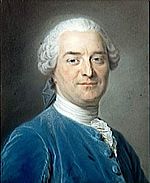Charles Pinot Duclos facts for kids
Quick facts for kids
Charles Pinot Duclos
|
|
|---|---|
 |
|
| Born | 12 February 1704 Dinan, Brittany, France |
| Died | 26 March 1772 (aged 68) Paris |
| Occupation | Writer |
| Nationality | French |
| Period | 18th century |
| Genre | History, memoirs |
Charles Pinot Duclos (born February 12, 1704 – died March 26, 1772) was a famous French writer. He was also a key person who helped create the Encyclopédie ou Dictionnaire raisonné des sciences, des arts et des métiers. This was a huge collection of books that shared knowledge about science, arts, and crafts.
Contents
About Charles Duclos
Charles Duclos was born in Dinan, a town in Brittany, France. He later moved to Paris to study. For a while, he enjoyed himself and spent time with friends. Then, he started spending time with smart and witty people.
Early Writings
Duclos joined a club of young writers. They published their works under fun titles like Recueil de ces messieurs (Collection of these gentlemen). His story Acajou et Zirphile came from a challenge among his friends. He wrote it to go with some pictures that were meant for another book. He also wrote two other popular stories: The Baroness de Luz (1741) and Confessions of Count de *** (1747).
Joining the Academies
Charles Duclos became a member of two very important French groups. These groups were for smart people who studied history, languages, and literature.
Academy of Inscriptions
In 1739, Duclos joined the Academy of Inscriptions. This group focused on history and ancient texts. He wrote many important papers for them. These papers were about things like old ways of settling arguments (trial by combat). He also wrote about the history of the Celtic and French languages. He even studied old plays and how they were performed.
Académie Française
In 1747, Duclos became a member of the Académie Française. This is a very famous group that works to protect the French language. He was even chosen to be its permanent secretary. He helped create a new edition of their important Dictionary in 1762. Duclos also made smart comments about the Port Royal Grammar, a famous book about French grammar.
He often stood up for the honor of these groups. He also defended the importance of writers and scholars in general. He once said that he would leave behind a name that writers would remember fondly. In 1764, he was also made a Fellow of the Royal Society in England.
Duclos as Mayor
The people of Dinan, his hometown, really liked Duclos. He always supported their interests. In 1744, they made him the mayor of their town. This was special because he lived in Paris at the time. As mayor, he took part in important meetings for the region of Brittany. Because of his work, the king gave him special letters of nobility.
Travels and Later Life
In 1763, Duclos was advised to leave France for a while. This was because he had shared his opinions on a disagreement between two important people: the duc d'Aiguillon and M. de La Chalotais. M. de La Chalotais was Duclos's friend. So, Duclos first traveled to England in 1763. Then, he went to Italy in 1766. When he returned, he wrote a book called Considerations on Italy. He passed away in Paris.
Duclos's Personality and Works
People thought Duclos had a mix of being quick to act and being careful. The famous writer Jean-Jacques Rousseau described him as a man who was "straight and clever." Duclos could sometimes be very direct, which made some people dislike him. His sharp wit also created some enemies. But to those who knew him well, he was a fun person to be around. Many of his clever sayings have been remembered by people who wrote about his life.
Important Books
His first serious book was History of Louis XI. This book was direct and to the point. It showed that Duclos did a lot of research and was fair in his writing. Duclos became even more famous when he published Considérations sur les mœurs de ce siècle (Reflections on the Customs of this Century) in 1751. This book was praised for its smart and thoughtful ideas. It was even translated into English and German.
Duclos also wrote Mémoires pour servir à l'histoire du dix-huitième siècle (Memoirs to Serve the History of the Eighteenth Century). This book was meant to be a follow-up to his earlier work. However, it was not as good and was more like a story than a true history. Because of his History of Louis XI, he became the official historian of France. This happened when Voltaire retired from that role. Duclos's Secret Memoirs of the Reigns of Louis XIV and Louis XV were not published until after the French Revolution. He was able to use the writings of Louis de Rouvroy, duc de Saint-Simon for this work.
A full collection of Duclos's works, including a part of his life story that he didn't finish, was published in 1821.
See also
 In Spanish: Charles Pinot Duclos para niños
In Spanish: Charles Pinot Duclos para niños
 | Aurelia Browder |
 | Nannie Helen Burroughs |
 | Michelle Alexander |

